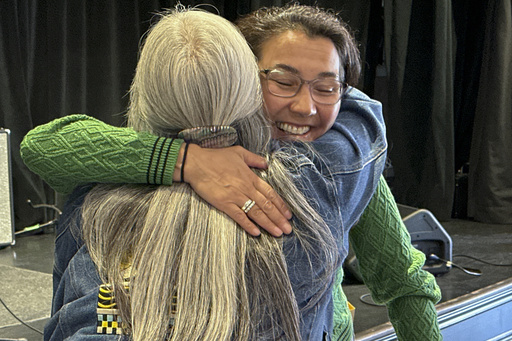Democratic U.S. Rep. Mary Peltola, along with Republicans Nick Begich and Nancy Dahlstrom, have secured spots in November’s ranked-choice general election for Alaska’s sole U.S. House seat. These three candidates emerged as the top contenders from a pool of 12 candidates competing in Alaska’s primary election. Under Alaska’s open primary system, voters were required to select one candidate, leading to the top four candidates advancing to the ranked-choice general election, regardless of their party affiliation.
Peltola is leading in the initial vote count, followed by Begich in second place, and Dahlstrom in third. The identity of the fourth candidate has not been determined yet.
The primary outcome sets the stage for a highly anticipated and closely watched race in the fall. With the Republican Party aiming to regain the seat previously held by Republican U.S. Rep. Don Young for 49 years prior to his passing in 2022, the competition is expected to be intense. Peltola made history by becoming the first Alaska Native elected to Congress in special and regular elections held that same year.
Begich, who previously ran for the seat in 2022, garnered local Republican group support for his current campaign. Dahlstrom, Alaska’s lieutenant governor, received endorsements from former President Donald Trump and several prominent House leaders. Begich had indicated his intention to withdraw if he trailed behind Dahlstrom, a commitment that Dahlstrom did not mirror. Both candidates positioned themselves as capable of defeating Peltola.
Despite gaining prominence in 2022 for her emphasis on political civility, Peltola has encountered challenges in her re-election bid by navigating the polarized political landscape. She faced criticism on social media for her neutral stance towards the presidential race and declined to endorse then-Vice President Kamala Harris. Peltola clarified that she would not support former President Trump but also faced backlash for siding with Republicans on a resolution regarding Harris’ role in border affairs.
Alaska’s voter base primarily consists of individuals not affiliated with any political party, a crucial factor Peltola highlighted in explaining her decision not to endorse any candidate. The year 1964 marked the last time Alaska supported a Democratic presidential nominee.
The level of activity in this year’s race has been comparatively subdued when contrasted with the frenzy following Young’s passing two years ago. Nearly 50 candidates, including Sarah Palin, participated in the special primary to replace him then.
Peltola, a Yup’ik and former state legislator from a rural community, won the special general election in 2022 to complete Young’s remaining term. Her platform emphasized “fish, family, and freedom” as she portrayed herself as a unifying figure. The debut of Alaska’s open primary and ranked-choice general election system coincided with Peltola’s victory in that election year, generating diverse opinions on the effectiveness of this electoral format.
Proponents of ranked voting laud its capacity to offer voters increased options and reward candidates appealing to a wider electorate. Conversely, opponents deem the system as perplexing, coercing voters to prioritize candidates they may not fully support.
Amid the primary election proceedings, several polling sites encountered delays in opening, with some eventually commencing operations later in the day. Issues were reported in several Alaska Native communities, impacting voter participation in those areas.
Trump’s endorsement of Dahlstrom criticized Begich for past Republican defeats, positioning Dahlstrom as a key contender to secure the seat. Begich, belonging to a family with a Democratic legacy, aimed to consolidate Republican support by pledging to step back if he lagged behind Dahlstrom in the primary. Both candidates emphasized the necessity of unity among conservatives to challenge Peltola in the upcoming general election.
Following the primary results, Dahlstrom expressed interest in collaborating with key Republican figures to assess the electoral landscape and strategize for securing conservative votes necessary for victory in the general election.
